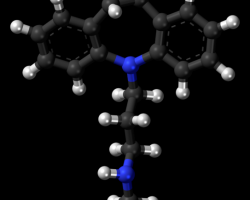Among the earliest of the antidepressants, tricyclic antidepressants (TCAs) are still effective, but have generally been replaced by newer drugs that cause fewer side effects. If those newer generation antidepressants fail, tricyclic antidepressants or tetracyclic antidepressants may still be prescribed. They are used to treat depression, obsessive compulsive disorder and bedwetting. Off-label they are often used for panic disorder, bulimia, chronic pain, phantom limb pain, chronic itching and severe premenstrual symptoms.
Like other antidepressants, the TCA variety also affect the neurotransmitters or chemical messengers in the brain. The neurotransmitters relay messages within the brain, helping the cells communicate with each other. It is believed that depression and other mental disorders are caused by an imbalance of chemicals in the brain which make communication between the cells slow down or stop.
Cyclic antidepressants block the absorption, also referred to reuptake, of the neurotransmitters serotonoin and norepinephrine. Once that’s accomplished, there is more the chemical in the brain for better absorption. More serotonin or norepinephrine, the better the messages get passed between cells. The increase in serotonin also elevates mood. TCAs also block the action of acetylcholine, another neurotransmitter. They also cause sedation and block the action of histamine.
However, in addition to changing mood, there are also other side effects caused by the medication. There are a variety of tricyclic antidepressants available and each one has its own set of side effects, but generally one might expect drowsiness, dry mouth, blurred vision, constipation, urinary retention, dissiness, delayed orgasm, low sex drive, elevated heart rate, disorientation, weight gain, fatigue, headache, sensitivity to light, nausea and seizures.
Seizures are specifically a problem with the drug maprotiline. Desipramine (Norpramin) and protriptyline (Vivactil) are characterized by drowsiness. Weight gain is typical with amitriptyline (Elavil) and doxepin (Sinequan).
Other drugs of this variety are clomipramine (Anafranil), amoxapine (Amoxapine tablets), imapramine (Tofranil), nortriptyline (Pamelor) and trimipramine (Surmontil).
It can take several weeks to know if a particular antidepressant is working. Then prescriptions or dosages may be changed. Sometimes several different antidepressants will be tried before the right one is found. In any case, never abruptly stop taking these meds. Withdrawal-like symptoms could occur.
Source: MayoClinic, RxList




